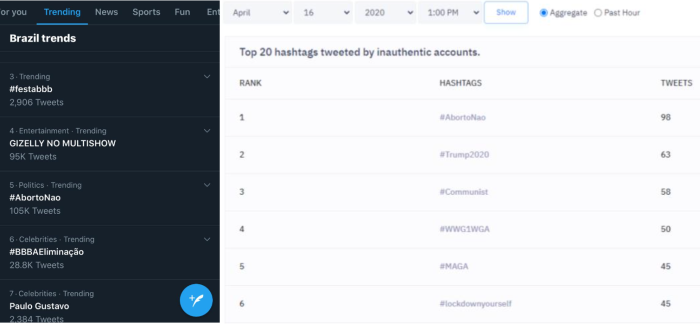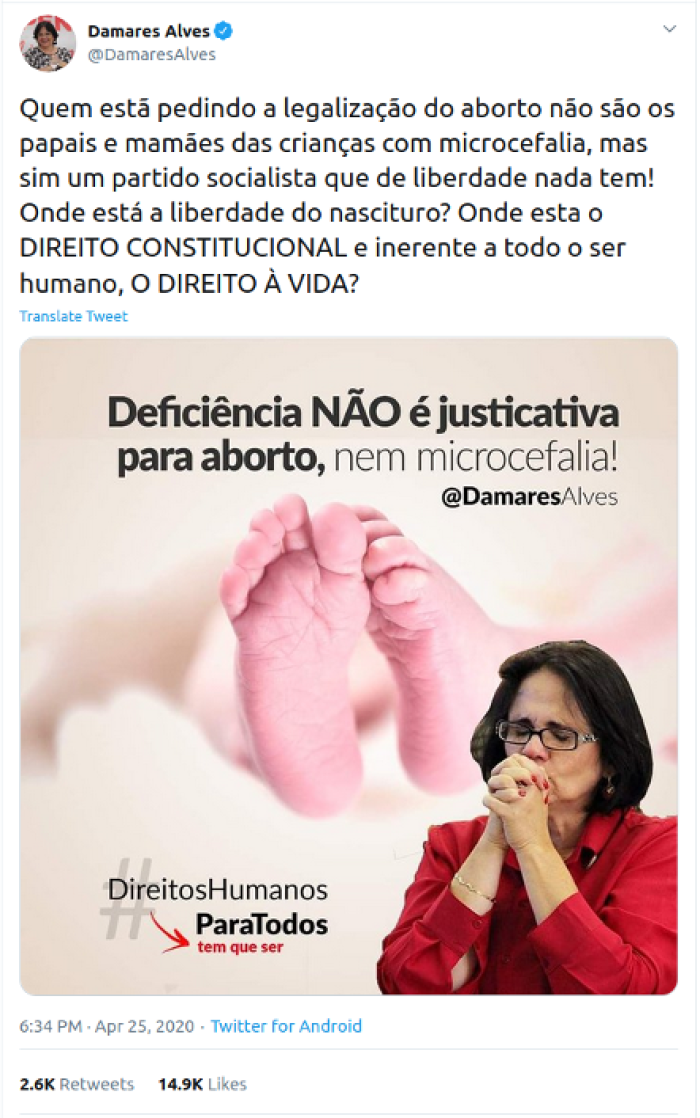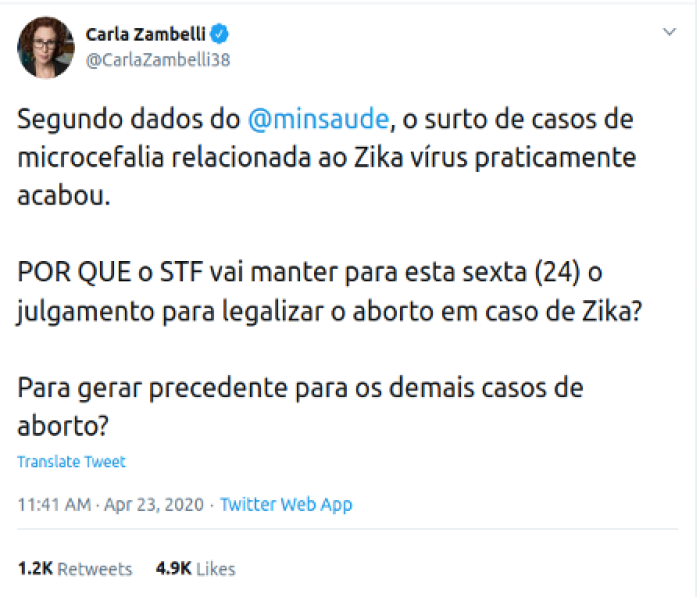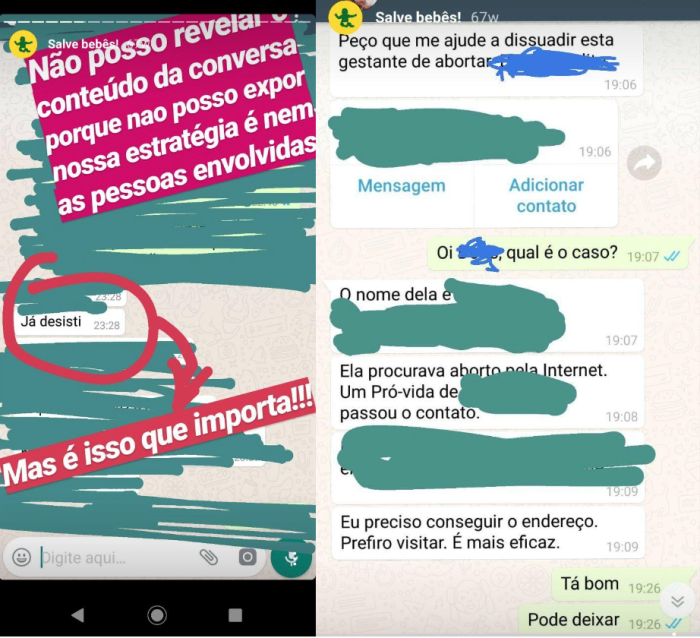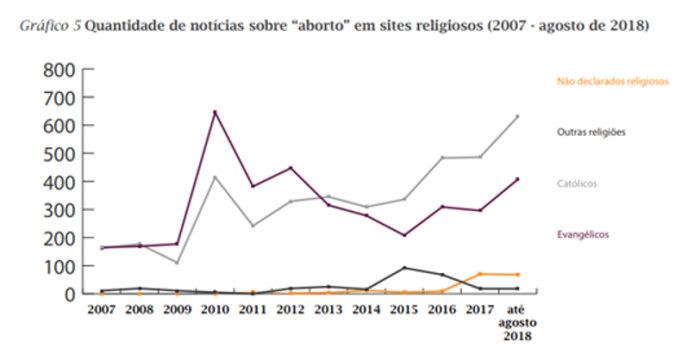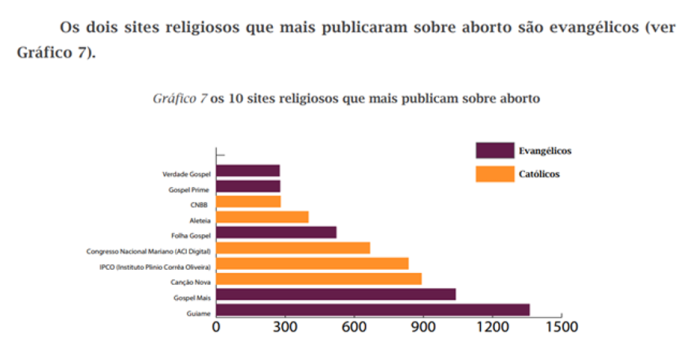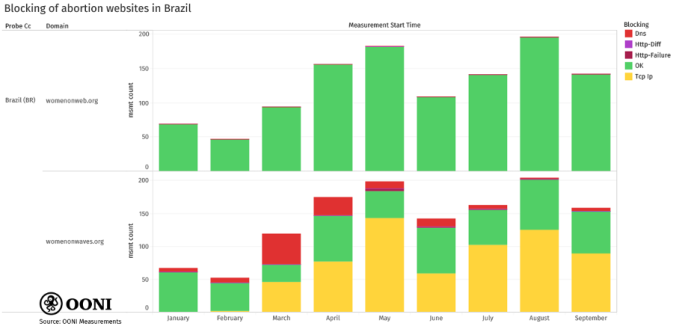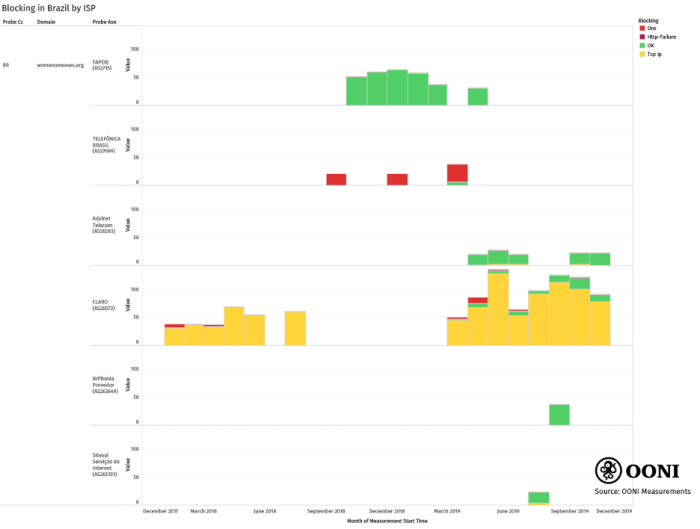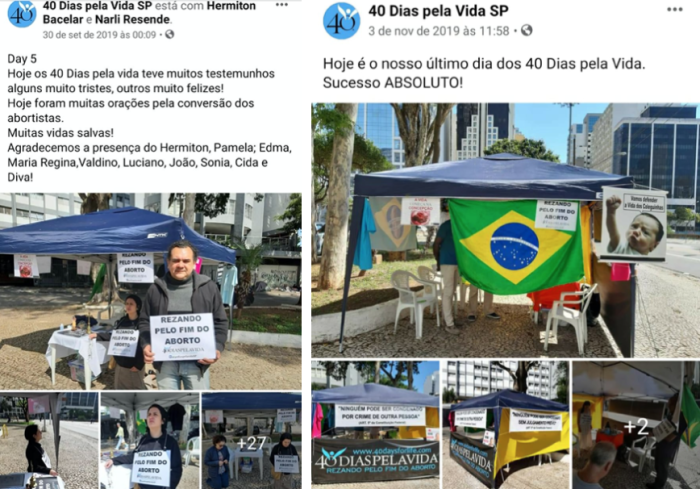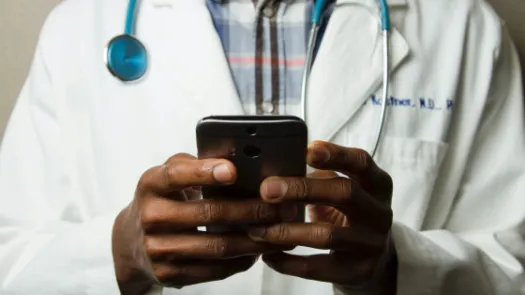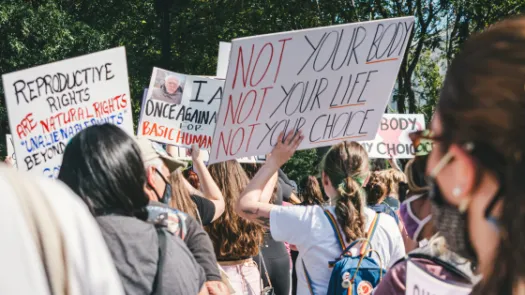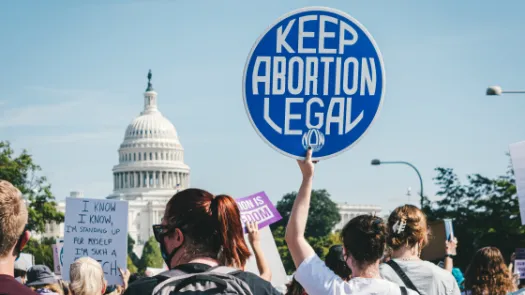
Country case-study: sexual and reproductive rights in Brazil
This country case-study was informed by research carried out by Coding Rights (Laura Alonso and Joana Varon).
- In Brazil, prominent government figures oppose the access to reproductive rights through the promotion of abstinence or the opposition to abortion in all circumstances
- Organisations and activists opposing abortion and reproductive rights have built an online-based movement to oppose the decriminalisation of abortion and demonise reproductive rights allies
- The opposition use neutrally-presenting websites and social media platforms to disseminate misleading information and dissuade women from seeking abortion care
- There is evidence to indicate that telecommunications companies have blocked websites promoting reproductive rights

1. What are the barriers to access safe and legal abortion care?
2. What are the barriers to access basic contraception?
3. What are the hurdles in accessing non-biased medical reproductive health information?
4. How is the use of technology influencing the reproductive rights space?
5. What foreign organisations have a large anti-reproductive rights presence?
1. What are the barriers to access safe and legal abortion care?
Abortion is considered a crime in Brazil, except in cases of pregnancy resulting from rape, when it puts the woman's life at risk or, most recently, in cases of fetal anencephaly. Article 273 of the Penal Code also forbids the sale or distribution of medication that is not registered at Anvisa (National Health Agency), which is the case for abortion pills in Brazil. Misoprostol, the active substance of abortive medicines in the country, is subjected to special controls, and the distribution of medicines with this substance is restricted to a few hospitals registered within the Ministry of Health. Furthermore, the Penal Offenses Act (Lei das Contravenções Penais) also establishes a fine for those “advertising the process, substance or object intended to cause abortion.” This provision in particular has been interpreted loosely in ways to restrict access to information about safe abortion.[1]
When the legal and safe voluntary termination of pregnancy is not possible, women in Brazil resort to clandestine and, most of the time, unsafe abortion procedures.[2] In 2017, it was estimated that more than 200 thousand women were hospitalized due to complications in clandestine procedures,[3]resulting in a death rate of 1 woman per unsafe abortion made every two days, affecting mostly young, black, and impoverished women.[4] As criminalization of abortion leads to under-reporting, it is likely that those numbers are even higher.
Online opposition campaigns
The abovementioned estimates were presented in a technical briefing produced by the Ministry of Health in ongoing proceedings at the Supreme Court challenging the constitutionality of anti-abortion provisions (ADPF 442), and their impact on the right to health, reduction of inequalities and protection of women’s lives, among other fundamental rights. The document produced by the Ministry considered that the existing provisions criminalizing abortion care posed a serious public health issue in the country.
The latest hearing in that case[5] took place in 2018, and was followed in social media under the campaign hashtag #NemPresaNemMorta (“not arrested, neither dead”). At the occasion, the Supreme Court heard 53 witnesses. Though most of them were in favor of the proposal, other witnesses were affiliated to most active opposition groups in Brazil, including the movement Brazil Against Abortion, the Life Restructuring Center and the Association of Evangelical Jurists.
A few months after the hearing, feminist activists had to flee the country after receiving online threats for defending the decriminalization of abortion. Among those that were targeted were: Lutheran pastor Lusmarina[6], the activist Camila Mantovani from the Evangelical Coalition for the Legalization of Abortion[7], and Debora Diniz[8], member of Anis - Bioethics Institute. The case is still ongoing and the Minister of the Supreme Court, Rosa Weber, is yet to bring the judgment to the agenda for the court to reach a final verdict.
On April 15th 2020, the Supreme Court had also scheduled a vote to address a constitutional action (ADI 5581) brought by the National Association of Public Defenders in 2016, when Brazil was an epicenter of the zika epidemic.[9] The claim demanded that victims of the zika outbreak (women, children affected by the Congenital Zika Syndrome and their families) be guaranteed universal access to effective and long-term contraceptives, and called for the decriminalization of abortion for women infected with the virus. One day after the announcement, on April 16th, the opposition movement reacted en masse to the issue on Twitter, making it a trending topic under the hashtag #AbortoNão (“no abortion”).
On April 16th, #AbortoNão was the 5th most tweeted topic in Brazil, and the project Bot Sentinel identified at least 98 inauthentic accounts tweeting #AbortoNão.
On the verge of the voting, on April 23, #AbortoNão once again became a Brazilian trending topic on Twitter. The hashtag was also boosted by the anti-reproductive rights movement. The case was dismissed and archived, without analysis of the merits.[10]
Among the main promoters of the hashtag were the Minister of Women, Family and Human Rights and the anti-abortion far-right church pastor Damares Alves. At the time of writing, the Minister is also the National Secretary for Institutional Relations of one of the largest opposition Brazilian organizations, called Brasil Sem Aborto (Brazil Without Abortion).[11] The group is responsible for organizing a series of events and marches against abortion - including the National March “for Life”. The march has been held annually since 2007, in Brasilia, and is inspired by the March for Life from the United States.
A second profile that was heavily shared in the #AbortoNao's campaign was the far-right federal deputy Carla Zambelli. Zambelli has been involved in several accusations of dissemination of misinformation and libel, slander and defamation. In 2018, she was fined in R$40.000,00[12] (around US$10.000,00 by the time) for falsely accusing LGBT activist and federal deputy, Jean Wyllys, of committing crimes. Given her large influence in social media, she was able to successfully crowdfund the fine. Even though Jean Wyllys had won the case against Zambelli, he felt forced to leave the country due to the death threats he received after the accusations made against him.
Another prominent profile was the self-proclaimed “ex-feminist” Sara Winter. In 2019, she was nominated national coordinator for maternity policies to work with Damares Alves at the Ministry of Women, Family and Human Rights. On that occasion, she promised to fight against abortion care.[13] She resigned a few months after her appointment, allegedly to focus on antiabortion conferences and movements.
On the same day that #AbortoNão was the 5th most commented topic on Twitter, Winter posted a video[14] in her YouTube account containing false information about the consequences of abortion[15] and encouraged people to promote the hashtag #AbortoNão (#NoAbortion) against the proposal.
Beyond their role as heavy influencers of the opposition movement in social media, Zambelli, Alves and Winter have been very vocal in criticizing and threatening Ministers of the Supreme Court, not only for bringing decriminalization of abortion to the agenda of the Court, but also due to other positions against decisions from Bolsonaro’s government.
Absence of information
Even considering the exceptional cases in which voluntary interruption of pregnancy is legally permitted, access to safe abortion care and to information about available support services is far from simple. Research on access to information about legal abortion care in Brazil,[16] led by Article 19 Brazil, concluded that the “quantity and quality of information offered by public health institutions about sexual and reproductive rights, particularly on legal abortion, is below what is expected”, representing a risk to public health and a significant barrier to women’s rights. Among the main findings was the lack of information about which hospitals could provide support for legal abortion care or even the lack of specific sections or webpages addressing abortion care, sexual violence, or sexual and reproductive rights in the websites of health departments from each State of the federation.
2. What are the barriers to access basic contraception?
In theory, the National Health System (Sistema Único de Saúde) is licensed to provide the following contraceptive methods: contraceptive pills, injectable hormones, morning-after pills, diaphragms, non-hormonal IUDs (intrauterine device), sterilization, and preservatives. However, it is reported that in recent years that hormonal and more aggressive forms of contraception, such as sterilization, have been prioritized by the public health services, combined with a low supply of long-term contraceptive methods and inaccurate and misleading health information.[17] According to the Brazilian Institute of Geography and Statistics[18], only nine capital cities in Brazil offer all contraceptive methods listed in the National List of Essential Medicines.
3. What are the hurdles in accessing non-biased medical reproductive health information?
Government-led opposition to sexual and reproductive rights
The rise of the far-right and conservative politicians has further compounded the threats to sexual and reproductive rights, and in particular the access safe and legal abortion care, modern contraception and even non-biased reproductive health information.
In the most recent elections, by the end of 2018, the increased number of opposition-minded politicians elected as legislators resulted in several draft bills being proposed either to further criminalize abortion or to make it harder to get support in the 3 exceptional cases permitted by law. In 2019, the Ministry of Human Rights was renamed as the Ministry for Women, Family and Human Rights, and that Alves was appointed as Minister.
Since Alves’ appointment, attempts to undermine access to reliable information on sexual and reproductive rights have multiplied. Last year, Alves requested the Public Attorney to sue the feminist news portal Azmina, due to a publication[19] explaining the 3 cases in which abortion is legal in Brazil and providing further information on safe abortion care originally developed by the World Health Organization. This material could be considered neither a crime nor a public offense, given that it outlined a standard medical protocol. Nevertheless, Alves decided to sue them and tweeted that their article was an “apology of crime”, posing serious threat to access to information about safe and legal abortion.
In 2020, just a few weeks before the Carnival, Alves launched a campaign for sexual abstinence.[20] In a country where teenage pregnancy is often the result of rape and unwanted pregnancy is rooted in several layers of gender inequality and its intersectionalities, the failure by the Minister to highlight issues of sexual violence, sexual education and information about contraceptive methods – instead calling for abstinence – could cause great harm by omission.
The reach of these unsubstantiated approaches to reproductive rights is gradually being institutionalized in international forums. In 2019, during the UN 63rd session of the Commission on the Situation of Women, the Brazilian delegation presented several reservations against the Conference’s conclusions, noting that the text on “ensuring universal access to sexual and reproductive health services” was an apology to abortion.[21] In complete opposition to globally recognized anti-discrimination and equality standards, the delegation also rejected references to gender diversity, stating that “gender is a synonym of sex and that sex is biologically defined as men and women.” In fact, Brazilian diplomats have been opposing the use of the term “gender” since the presentation Brazil’s candidacy for renewal of the country’s seat at the UN Human Rights Council. On that occasion, the president tweeted “the main agenda of the Brazilian government is to strengthen family structures and exclude mentions to gender."[22]
4. How is the use of technology influencing the reproductive rights space?
Open lines through inaccurate websites and Whatsapp
In Brazil, there’s evidence about the use of extended web services and an open line by the organization Associação Mulher, itself associated with the website Gravidez Indesejada.
The website invites women to start a live chat, send an email or get in contact through WhatsApp to schedule an appointment and to solve questions about abortion. Although the website does not indicate the type of support they provide, there is a lot of incorrect information about abortion pills, especially Misoprostol, and about abortion consequences. The website leads women to believe they can get help to do an illegal, but safe abortion, with no mention of its actual purpose, which is to convince them not to end the unwanted pregnancy.
A news article from Agência Pública describes two appointments in which an undercover journalist pretended to want to end an unwanted pregnancy. In both meetings, the first with a volunteer and the second with a psychologist, inaccurate information about abortion procedures and consequences were given, such as false scientific information about “post-abortion syndrome”. The report also highlights “psychological terrorism” during the appointments, in which one of the journalists was forced to see images of late unsafe abortions and to hold a plastic fetus, for example. Since the article was released, in January 2018, the website has changed its domain but is still active.
Instagram and anti-abortion influencers
Gravidez Indesejada on Instagram
The branch of the initiative Gravidez Indesejada in Rio Grande do Sul has a profile on Instagram,[23] in which they announce they can help women “defend their rights'' and support them “make their choices.” Although the profile does not mention they offer abortion care or abortion pills, the website narratives closely resemble those used by the pro-choice movement worldwide, presumably to attract the abortion-minded woman.
The profile does not allow comments in the posts, but all the publications refer to a WhatsApp line to provide help to women. The bio also refers women to the Gravidez Indesejada website, which contains inaccurate information about abortion and contraception, such as listing the untrue consequences of abortion pills.
According to an activist from “Nem Presa Nem Morta por Aborto”, a campaign in favor of abortion rights in Brazil, it’s common that profiles in Instagram openly announce abortion pills, so the profile from Gravidez Indesejada can easily be easily mistaken as a pro-choice space so women seeking for information on abortion reach them and get misleading information to change their minds.
Salve bebês
Salve bebês (Save Babies) is an initiative ostensibly led by opposition figure Sara Winter, which appears to exist solely as a highlight in her official Instagram account. On this platform, it is common to see posts of screenshots from Winter’s Whatsapp conversations in which she shows how people approach her to seek her help in dissuading pregnant women from seeking abortion care.
The screenshots below provide evidence that opposition figures with a strong social media following are able to disseminate their views through informal and unmonitored channels, with real consequences for the women “referred” to them. One of the notes written over the screenshots below states “I cannot reveal the content of the conversation because I cannot expose our strategy or the people involved”. This would suggest that these informal “referral” or “advice” channels are widespread.
Misinformation webpages
According to our interviewee, a reproductive rights researcher and activist, digital information agencies linked to religions or conservative political groups also play an important role in spreading misinformation about contraception and abortion care which they present as reliable information.
The research “Propagation of terms ‘gender ideology’ and ‘abortion’ in written Brazilian media”, done by Carla Gomes and published in 2020 by Sexuality Policy Watch (SPW), indicates that “abortion” is a common topic in catholic and evangelical news portals. The research counted the amount of content published on Catholic and Evangelical websites about “gender ideology” and “abortion”. Between January 1st, 2007 and the end of August and beginning of September 2018, these religious sites published a total of 8.303 news on abortion. [24]
Although the research does not address misinformation, a quick search on the websites that mostly mention “abortion” indicates that several of them publish unreliable or unsubstantiated information about abortion.
One of the most active opposition news portal is ACI Digital[25], “the Portuguese news service of the ACI group, headed by the ACI Prensa agency. ACI Prensa was originally founded under the name of Catholic Information Agency (ACI) and its main office is in Lima, Peru, where it is legally recognized as a non-profit educational association linked to the Catholic Church.”[26]
ACI Digital hosts several articles with supposedly scientific information about abortion. In one of them, for example, the author states, wrongly, that “life beginning at the conception is already peaceful and accepted by defenders of life, by science and even by those who defend the legalization of abortion.” [27] An editorial section of the website also describes abortion as “the death of a child in the mother's womb produced during any moment from the fertilization stage (union of the egg with the sperm) until the moment before birth.”[28] The same section also considers abortion to be infanticide. A different section also affirms that the IUD is abortive.[29]
The website “Estudos Nacionais” is also an online publisher and bookstore with several anti-abortion titles, which help to convey false data on the subject. No explicit connections to the broader opposition movement have been found.
The website also contests several official and/or scientific data about abortion. One article, for example, rejects information provided by the Ministry of Health that complications from abortion are the 5th leading cause of maternal mortality in Brazil. [30]
Blockage of Woman On Waves
In 2019, Coding Rights, in partnership with the Open Observatory of Network Interference (Ooni) and Women of Waves, published a report titled “On the blocking of pro-choice websites: Women on Waves and Women on Web.”[31] The research gathered data about internet interference on these two websites through OONI Probe[32] testing, a free software project that allows for decentralized monitoring of internet censorship around the world.
Women on Waves is an NGO founded in 1999 by Dutch physician Dr. Rebecca Gomperts, working to support women in countries with restricted access to safe abortion care. Their tactics are very creative, for instance, sailing to provide women with abortion services, contraceptives, information, and training in international waters, where local laws do not apply. More recently, it has even used robots[33] and drones[34] to deliver abortion pills to women in Poland and Northern Ireland.
In 2005, Dr. Rebecca Gomperts also founded Women on Web,[35] with the goal to provide online abortion services for women in countries where there is no legal access to medical abortion. Services include online consultations with a doctor[36] to support a safe abortion as well as to provide access to contraceptives[37] and information about the abortion process.[38] On the website, women can also find compelling stories from other women around the world who received abortion care.[39] For all this work, WoW is recognized worldwide as an important source of information on sexual and reproductive rights.
Relevant OONI measurements from Brazil[40] presented TCP/IP anomalies for connecting to womenonwaves.org.[41] The chart below illustrates OONI findings based on the testing of womeononweb.org and womenonwaves.org on multiple networks in Brazil from 1st January 2019 onwards. According to it, while womenonweb.org was accessible in the country, access to womeonwaves.org appeared to be blocked.
A more detailed analysis showed that while womenonwaves.org appeared to be blocked on several networks, it was not blocked on all networks in Brazil, as demonstrated in the chart below:
According to the report: “Most testing was performed on networks from telecommunication company Claro (AS28573), where multiple measurements consistently presented TCP/IP anomalies (since at least January 2018), strongly suggesting that this ISP blocked access to womenonwaves.org. Many anomalies were also detected on Telefônica Brasil (AS27699), which is branded as Vivo, suggesting potential blocking of womenonwaves.org on that network as well.”
The report also compared data from the Satellite test[42] of Censored Planet[43] (between 1st January 2019 to 30th September 2019), which also pointed out to DNS-based blocking of www.womenonwaves.org in Brazil.
In 2018, Dr. Rebecca Gomperts visited Brazil to give expert testimony[44] in a public hearing at the Supreme Court which considered whether the restrictive abortion laws in the country were violating constitutional protections. During her testimony, based on emails received through the Women on Web helpdesk, she highlighted the lack of access to legal abortion in Brazil in rape cases and even in cases where a woman’s life is at risk due to her pregnancy.
The report on the blocking of Women on Web was launched in partnership with The Intercept Brazil,[45] which sought answers from representatives from the telecommunications companies. The companies did not reply, and only the syndicate of telecommunications companies, SindiTelebrasil, vaguely replied stating that “such blockage would require a court order, but we cannot comment on court orders”. There was no confirmation as to whether blockage occurred, and if so where. Once the news article was published, Brazilian consumers started to test their connections to the websites and protest by tagging the companies and requiring explanations. Some of them replied with the very same text of SindiTelebrasil. As of today, June, 2020, the website remains blocked in the networks of some providers.
Sexual and Reproductive Health Apps
In 2020, the online magazine Azmina published a report about apps that provide information specifically about abortion and contraception. The article analyzed the apps, Euki, developed by Women Help Women, and Safe Abortion, developed by Hesperian Health Guides, both based on World Health Organization guidelines,[46] and an app developed by the Brazilian Minister of Health. With the exception of the app from the Brazilian government, all the others were in English and from international organizations.
Safe abortion
The app Safe abortion, which has more than 10.000 downloads in the Play Store, had no privacy policy directly related to the app when clicking on the privacy policy, users were redirected to the privacy policy of their website. A specific privacy policy for the app is needed, particularly because women can input sensitive information about their period in order to be able to estimate the length of their pregnancy and that the app navigation is led by questions. It is not clear if any records are kept of the users’ answers.
Euki
The app Euki, launched in mid-2019, is less popular with around 1.000 downloads in the Android Play Store. But it sets out specific privacy and security considerations. For instance, no login is required and information is kept only on users’ phones, with no cloud services attached. It also provides the option to have a pin for the app, the option to “enter a combination to display a fake screen” and allows the user to set a period for auto-destruction of the data. It works like a period tracker with extra functions related to sexual health.
Sexual and Reproductive Health
The app Sexual and Reproductive Health, developed by the Brazilian Ministry of Health in partnership with DataSUS – the department of informatics from Sistema Único de Saúde (SUS) – provides information about 20 topics related to sexual and reproductive health, including safe sex, domestic violence, equality, sexual rights and reproductive planning. It also contains a menstrual calendar in which the user can insert comments about their reproductive cycle, and a map with the location of all governmental health units nearby.
However, that the app is not user-friendly: its language is complex, with academic references and unnecessary repetitions of information, making it difficult for those looking for basic and simplified information on the subject. It also presents accessibility issues: the app is not available in either the Apple Store or Play Store, but instead requires the user to visit the Health Ministry website to download the app[47] and lower permissions to install apps from other sources (which is not the usual way for smartphone users to download an app). That procedure also poses some security risks, as it was not reviewed by third parties. We tried to download the app, but it did not run on our devices. The report from Azminas didn't mention if any information was available on the app about abortion rights in Brazil and legal abortion services. Due to the changes in the Brazilian government and in the Ministry of Health itself, the information provided in the app might have changed since.
Besides apps specifically focused on abortion or sexual and reproductive health, period trackers are more common in Brazil. In 2017, Coding Rights published the article “MENSTRUAPPS – How to turn your period into money (for others)”, a feminist analysis about the most used period trackers, considering both risks to privacy rights as well as the patriarchal heteronormative values embedded into their design and guidelines.[48]A few years later, in 2019, The Guardian published an article revealing that an app called Femm app was founded by anti-abortion, anti-birth control practices and anti-LGBTQAI catholic campaigners from the US closely related to the Republican Party.[49] By June 2020, the app had more than 100k downloads at the Play Store and is available in Brazilian app stores,[50] where information is in Portuguese. We however do not have information about the downloads for the country and, once downloaded, the app is in English. Nevertheless, it has some positive comments in Portuguese (and several in English). Women are seemingly unaware of the origin of the app.
While we do not have further information about the usages of that app in Brazil, Chilean doctor Pilar Vigil, who is listed as the medical director of The Reproductive Health Research Institute (RHRI), which supports Femm’s medical assertions, research and training, has been a frequent visitor in Brazil. As the International Director of Teen Star Programme, which is a program for sexual education that follows guidelines for sexual abstinence from the Catholic Church, she has been visiting the representation of that program in Brazil. It has been said that she inspired Minister Alves[51] in her speeches in favor of sexual abstinence.[52]
Whatsapp lines
The WhatsApp line Vera was created in 2017 during the Zika Virus epidemic in Brazil to support women in accessing their rights.[53] It also gives sexual and reproductive health information, since the contagion of the virus during pregnancy can lead to fetal malformations and pose risks to the health of pregnant women.
Vera is coordinated by the feminist organization Curumim, which “develops projects to strengthen women's citizenship”. It provides scientifically accurate information about reproductive and sexual rights and health, including what to do in case of sexual violence and information about legal abortion services and rights.
Artificial intelligence feminist chatbots
Beta is a feminist robot developed by the organization Nossas that works to engage people into pro-women’s rights activism.[54] Beta works as a Facebook chatbot. To contact Beta, the user just needs to visit its Facebook page and start a chat over Messenger. The automated interaction presents opportunities to pressure decision-makers in favor of or against a specific bill. Once in contact with Beta, the user will be notified every time an opportunity of action arises. Through this artificial intelligence users can also access general information about sexual and reproductive rights, like legal abortion, for example.
5. What foreign organisations have a large anti-reproductive rights presence?
The extremely conservative and prejudicial positions adopted by the Brazilian government are in close alignment with some sectors of the Trump administration. Brazil reportedly has been following the meetings of the Commission on Unalienable Rights[55], organized by the Department of State. Led by Mary Ann Glendon, former ambassador for the US in the Vatican, the Commission has been seen as an attempt to flexibilize the universality of Human Rights. Mary Ann Glendon herself has been publicly opposed to reproductive rights, to LGBT marriage and, addressing the UN institutions, has already said that “we need to question if these organizations defend families or if families need to be defended against them.”[56] Brazil was represented by Angela Gandra Martins, daughter of Ives Gandra Martins, a famous law professor member of Opus Dei.
The presence of anti-reproductive rights foreign organizations is at the foundation of many Brazilian pro-life groups. Through desk research and interviews with feminist activists on sexual and reproductive rights, we can say there are indications that those groups are particularly focused on: a) financing affiliates - especially crisis pregnancy centers; and b) training and financing groups and influencers in advocacy against the right to abortion. This initial investigation also points out that the use of technology is largely limited to Whatsapp, websites and profiles in social media to spread misinformation and misleading materials in order to create fear about abortion, and accordingly influencing women to continue their pregnancy. To the extent that the information below has been gathered from conversations with people who work directly to promote reproductive rights in the country, there are methodological limitations to this research.
Some of the opposition organizations that work in Brazil disseminating anti-reproductive rights views and even misinformation about abortion are branches of international organizations with shared goals, and operate based on a model that is common in Latin America: the crisis pregnancy centers.
An example of this operation was the website “Gravidez Indesejada”[57] (unwanted pregnancy), denounced[58]in 2018 by investigative journalists from Agência Pública for appearing as offering help to pregnant women seeking abortion care, but with the hidden purpose to persuade them not to, even in cases where abortion was legally permitted. Besides displaying incorrect information about abortion, the website reportedly led women to in-person meetings in which they were “dragged into pro-life lectures, grotesque slide shows, and non-abortion psychological terrorism sessions”[59] until they were convinced to give up on the abortion.
The news article about the website revealed a coordinated international network of anti-abortion activism. While the website claimed to belong to Associação Mulher, referred to as “a non-profit entity, with headquarters in several cities in Brazil and abroad”, no further information or public registration of such an organization was found by the journalists. But the domain name was registered on behalf of a priest linked to Opus Dei, priest Hélio Tadeu Luciano de Oliveira. The news piece investigated his public posts in social media, which showed that he was known as an opposition activist, rejecting abortion even in rape cases. The investigation also mentions that in many of his posts, the priest asked for support to CAM in order to “save millions of children from abortion, society, and women” and that he was also a priest for the Latin American Network of CAMs[60] and had opened a CAM affiliated house in Florianópolis, Brazil. The email address registered in the domain of the website was from Centro de Ajuda à Mulher - CAM.
Centros de Ajuda à Mulher (CAMs)
The first CAM was inaugurated in 1989 at Ciudad de México, by Jorge Serrano Limón, by then president of the National Pro-Life Committee. At the time, their strategy was to attract women seeking abortion care, but instead of websites, they would use advertisements in newspapers. Since then, the network of CAMs has multiplied to 20 countries in Latin America, with funding from far-right politicians and entrepreneurs.
According to a report[61] from 2020 by Open Democracy, the Centros de Ayuda para la Mujer (CAMs) are financially supported by Heartbeat International. Heartbeat International has affiliates in 700 different locations across the world, and in Latin America, they operate mainly through the Latin American Network of Women's Aid Centers (Red Latinoamericana de Centros de Ayuda para la Mujer - CAMs). According to Heartbeat International’s website[62], they have affiliates called “Salva Una Vida” present in 7 different locations in the south and southeast regions of Brazil (Florianópolis/SC, Jacareí/SP, Piracicaba/SP, Porto Alegre/RS, Rio de Janeiro/RJ, Santana/SP, and Três Rios/SC). Although there’s no mention of the kinds of services they provide, a search in CAMs' website[63] reveals that the locations indicated by Heartbeat’s website coincide with the ones listed as CAMs’ offices in Brazil, which would suggest that they are part of Heartbeat International’s network in the country.
According to a spreadsheet obtained by Agência Pública in CAM’s website, the aid center the reporters visited is also listed as one of the CAMs headquarters in the country.[64] The connections between the website Gravidez Indesejada, Associação Mulher and the CAMs were reportedly apparent during the reporter's visit to one of the offices. CAM’s logo was in the patient’s medical form, for example.
Heartbeat International
Desk research carried out on Heartbeat International’s website[65] indicates that they support other Brazilian organizations linked to crisis pregnancy centers. The main organization mentioned in Heartbeat’s website is Cervi - Centro de Reestruturação para a Vida (Life Restructuring Center). Cervi’s website[66] follows the example of many opposition-managed websites, as it does not straightforwardly explain its position regarding abortion: “We are CERVI - a non-economic organization that offers comprehensive assistance to women and family members who face an unexpected pregnancy, victims of sexual abuse, domestic violence or who have experienced abortion.”[67]Sara Winter, the abovementioned anti-abortion activist being investigated for misinformation, also supports CERVI.[68]
According to a reproductive rights activist who was interviewed from this report, the strategy adopted by crisis pregnancy centers, such as CAMs and Gravidez Indesejada, to deceive women seeking abortion, is also popular in Facebook groups. A while ago, our interviewee was contacted by a woman convinced by one of those groups to travel to a different state to access Misoprostol. When she reached the destination, after spending money and missing her job, she found out that she was being misled by a group of missionaries trying to dissuade her from abortion: “We concluded that one of the perverse strategies of this group was to lead women's resources and time to the exhaustion so they would not be able to access the procedure in other ways. We have been unable to hold any of these groups accountable, given that the women who have already contacted us were in such a fragile situation that they declared being unable to face legal procedures.”
Besides its affiliates in Brazil and the connection with the website Gravidez Indesejada and with CERVI, Heartbeat International’s website also suggests they’re connected to other anti-abortion movements in Brazil, such as National Confederation of Family Natural Planning[69] (Confederação Nacional de Planejamento Natural da Família), focused on teaching and studying the Billings Ovulation Method (created and supported worldwide by the American organization World Organisation Ovulation Method Billings).
Alliance Defending Freedom
One of the interviewees for the report stated that international opposition movement fosters opportunities to participate in international legal training. According to the interviewee, “Brazilian Catholic and evangelical activists have already undergone training processes at Alliance Defending Freedom,[70] an American conservative Christian organization that offers training to defend "religious freedom, the sanctity of life, marriage and family". “The Associação Nacional de Juristas Evangélicos[71] (National Association of Evangelical Jurists) also periodically selects students and recent law graduates for a training internship at Alliance Defending Freedom”, our interviewee told us.
Human Life International (HLI)
A report from El Pais[72], from 2019, also describes the presence of Human Life International in the founding of the Brazilian anti-choice movement and in the advocacy against abortion care in the country. Human Life International has been active in Brazil since at least 1989, when the Movimento em Defesa da Vida[73](Brazilian Movement in Defense of Life) was launched. Its founder, Paul Marx, came to Brazil to support the Movement’s first action: to “rescue” women from an illegal abortion clinic in Rio de Janeiro, Brazil. Similarly, HLI helped fund the anti-choice organization Pró-Vida de Anápolis, directed by the priest Luiz Carlos Lodi da Cruz, who is one of the main figures among the opposition advocacy movement in Congress. According to the news article, that international organization also supports the advocacy work of Hermes Rodrigues Nery, coordinator of Movimento Legislação e Vida (Legislation and Life Movement).
40 days for life
Another opposition group with close ties to international movements is the Brazilian affiliate of “40 days for life”, a campaign created in the United States and present in more than 63 countries, according to its website.[74] Their action consists of camping in front of reproductive health facilities and praying for the end of abortion during 40 days. They also use their Twitter[75] account to invite people from the community around to join the action in prayer for the end of abortion.
In September 2019, the group “40 days for life - São Paulo” started camping in front of the Hospital Pérola Byington, in São Paulo, a referral center for female survivors of sexual violence. The hospital was responsible for half of the legal abortions made in the State of São Paulo from 2015 until 2019, according to the State Health Secretary.[76]
Although they do not seemingly offer any type of help or counselling to women seeking for abortion services,[77] the coordinator of the Brazilian chapter of 40 days for life, Celene Salomão de Carvalho, said in an interview that there are two entities that support their actions in the country: Guadalupe Association and, once again, CERVI (Center for Restructuring for Life) was involved. Both of them are crisis pregnancy centers.[78]
During the action in Brazil, an article from the investigative journalism Agência Pública reported they not only harassed hospital employees and patients, but also physically assaulted a woman seeking medical help after being raped.[79]
[1] https://assets-institucional-ipg.sfo2.cdn.digitaloceanspaces.com/2020/02/AbortoNoBrasil2020_Web.pdf?fbclid=IwAR0o4FB_yMHdJ_raaRFHHj-eEILTNz2zh3C6k1CwJjyAQGLPYeJpd18dlEg
[2] https://www.jota.info/wp-content/uploads/2018/08/312d26ded56d74e21deec42b8cf612e8.pdf
[3] https://www.jota.info/jotinhas/ministerio-saude-ilegalidade-nao-impede-pratica-aborto-03082018+&cd=7&hl=en&ct=clnk&gl=br&client=ubuntu
[4] DINIZ, Debora et al.Pesquisa Nacional de Aborto 2016. Rio de Janeiro. Ciência & Saúde Coletiva [online]. 2017, v.22, n.2, pp. 653-660. ISSN 1678-4561. Disponível em: https://doi.org/10.1590/1413-81232017222.23812016.
[5] https://www.womenonweb.org/en/page/16662/women-on-web-testimony-for-the-supreme-court-in-brasi
[6] https://apublica.org/2018/09/ameacadas-de-morte-por-quem-se-diz-pro-vida/
[7] https://g1.globo.com/rj/rio-de-janeiro/noticia/2019/04/26/jovem-evangelica-relata-ameacas-por-defender-a-legalizacao-do-aborto-e-vai-deixar-o-brasil.ghtml
[8] https://www.theguardian.com/global-development/2018/aug/02/professor-forced-into-hiding-by-death-threats-over-brazil-abortion-hearing
[9] https://www.jota.info/paywall?redirect_to=//www.jota.info/justica/acao-levada-ao-stf-pede-protecao-de-direitos-vitimas-da-epidemia-de-zika-24082016
[10] http://www.stf.jus.br/portal/cms/verNoticiaDetalhe.asp?idConteudo=442504
[11] https://brasilsemaborto.org/quem-somos/
[12] https://www.uol.com.br/universa/noticias/redacao/2019/01/31/carla-zambelli-fala-de-jean-wyllis-olavo-de-carvalho-e-bolsonaro.htm
[13] https://www.uol.com.br/universa/noticias/redacao/2019/04/26/sara-winter-amar-outra-mulher-nao-e-ser-feminista.htm
[14] https://www.youtube.com/watch?v=RVCteXwqhjo
[15] https://www.youtube.com/watch?v=RVCteXwqhjo
[16] https://mapaabortolegal.org/wp-content/uploads/2019/03/AbortoLegaleTransparencia.pdf
[17] https://revistamarieclaire.globo.com/Mulheres-do-Mundo/noticia/2019/07/ministerio-da-saude-nao-compra-diu-para-o-sus-desde-2015.html
[18] http://www.generonumero.media/capitais-metodos-contraceptivos-sus-falha-diu/
[19] https://azmina.com.br/especiais/como-e-feito-um-aborto-seguro/
[20] https://www.cartacapital.com.br/opiniao/damares-alves-e-a-falacia-da-abstinencia-sexual/
[21] https://www.bbc.com/portuguese/brasil-47675399
[22] https://oglobo.globo.com/mundo/governo-bolsonaro-inclui-familia-elimina-mencoes-genero-pobreza-tortura-em-candidatura-na-onu-23798604
[23] https://instagram.com/gravidez.indesejada.rs?igshid=jk2fkcx52oei
[24] https://sxpolitics.org/ptbr/wp-content/uploads/sites/2/2020/02/Ebook-Propagac%CC%A7a%CC%83o-20200203.pdf
[25] https://www.acidigital.com/
[26] https://www.acidigital.com/quemsomos.htm
[27] https://www.acidigital.com/vida/aborto/legalizacao.htm
[28] https://www.acidigital.com/vida/aborto/definicao.htm
[29] https://www.acidigital.com/vida/aborto/diu.htm
[30] https://www.estudosnacionais.com/20917/quebrando-o-tabu-divulga-falacias-e-manipulacao-em-8-razoes-para-legalizar-do-aborto/
[31] https://medium.com/codingrights/on-the-blocking-of-pro-choice-websites-women-on-waves-and-women-on-web-505ed6f17b63
[32] https://ooni.org/install/
[33] https://www.womenonwaves.org/en/page/7525/in-collection/7524/abortion-robot-on-stage-in-poland--2018
[34] https://www.womenonwaves.org/en/page/6402/abortion-drones
[35] https://www.womenonweb.org/
[36] https://www.womenonweb.org/en/i-need-an-abortion
[37] https://www.womenonweb.org/en/page/9184/get-contraceptives
[38] https://www.womenonweb.org/en/page/6905/questions-and-answers
[39] https://www.womenonweb.org/en/page/488/i-had-an-abortion
[40] https://api.ooni.io/files/by_country/BR
[41]https://explorer.ooni.org/measurement/20191014T012930Z_AS28573_OMGOO3qgceIpj8sCZTmrQa6WQVzUhpuBCP2XlT56og7cmjPpKv?input=https://www.womenonwaves.org/\
[42] https://censoredplanet.org/projects/satellite
[43] https://censoredplanet.org/
[44] https://www.womenonweb.org/en/page/16662/women-on-web-testimony-for-the-supreme-court-in-brasil
[45] https://theintercept.com/2019/12/12/net-claro-e-vivo-bloqueiam-site-aborto-seguro/
[46] https://azmina.com.br/reportagens/informacao-sobre-aborto-e-contracepcao-ha-apps-para-isso/
[47] https://mobilems.saude.gov.br/saude-sexual-reprodutiva
[48] https://chupadados.codingrights.org/en/menstruapps-como-transformar-sua-menstruacao-em-dinheiro-para-os-outros/
[49] https://www.theguardian.com/world/2019/may/30/revealed-womens-fertility-app-is-funded-by-anti-abortion-campaigners
[50] https://play.google.com/store/apps/details?id=org.femmhealth.femm&hl=pt_BR&referrer=utm_source%3Dgoogle%26utm_medium%3Dorganic%26utm_term%3Dfemm%20app%20brasil&pcampaignid=APPU_1_NDHfXpjEGY-_5OUPiIq54Aw&showAllReviews=true
[51] https://interferencia.cl/articulos/pilar-vigil-la-ginecologa-chilena-que-inspira-la-politica-de-abstinencia-sexual-de
[52] https://oglobo.globo.com/sociedade/governo-defende-abstinencia-sexual-contra-gravidez-precoce-1-24169206
[53] https://www.brasildefato.com.br/2020/03/05/servico-de-whatsapp-atende-mulheres-vitimas-de-violencia-sexual
[54] https://www.politize.com.br/beta-robo-feminista-direitos-das-mulheres/
[55] https://www.state.gov/commission-on-unalienable-rights-public-meeting
[56] https://noticias.uol.com.br/colunas/jamil-chade/2020/02/18/eua-redefinirao-direitos-humanos-e-brasil-envia-representante.htm?cmpid=copiaecola
[57] http://www.gravidezindesejada.com/
[58] https://apublica.org/2018/01/armadilha-para-mulheres/
[59] https://apublica.org/2018/01/jornalistas-mexicanos-investigaram-fundador-do-cam/
[60] http://www.camslatinoamerica.com/
[61] https://www.opendemocracy.net/en/5050/trump-linked-religious-extremists-global-disinformation-pregnant-women/
[62] https://www.heartbeatinternational.org/index.php?option=com_civicrm&task=civicrm/profile&Itemid=1502&_qf_Search_display=true&qfKey=396835e01d5d14d3fe5c47a82ac053ab_1539
[63] http://www.camslatinoamerica.com/presencia.html
[64] https://apublica.org/2018/01/armadilha-para-mulheres/
[65] https://www.heartbeatinternational.org/worldwide-directory
[67] http://cervi.org.br/quem-somos/
[68] https://www.youtube.com/watch?v=qRAHA6a8Pi0&t=2s
[69] https://www.cenplafam.com.br/
[70] https://en.wikipedia.org/wiki/Alliance_Defending_Freedom
[72] https://brasil.elpais.com/brasil/2019/04/24/politica/1556137351_969753.html
[73] https://www.semprefamilia.com.br/defesa-da-vida/movimento-pro-vida-se-organiza-e-cresce-no-brasil/
[74] https://www.40daysforlife.com
[75] https://twitter.com/40daysforlife?lang=en
[76] https://g1.globo.com/sp/sao-paulo/noticia/2020/03/26/hospital-referencia-para-aborto-legal-no-brasil-suspende-procedimento-e-se-torna-local-de-triagem-de-gripe-em-sp.ghtml
[77] https://www.40daysforlife.com/about-overview.aspx
[78] https://www.acidigital.com/noticias/pro-vidas-se-unem-em-oracao-por-40-dias-em-sao-paulo-pelo-fim-do-aborto-18514
[79] https://apublica.org/2019/10/grupo-pro-vida-constrange-vitimas-de-estupro-em-frente-a-hospital/
